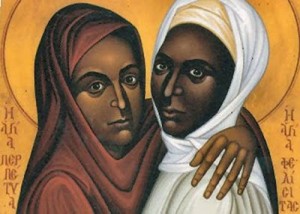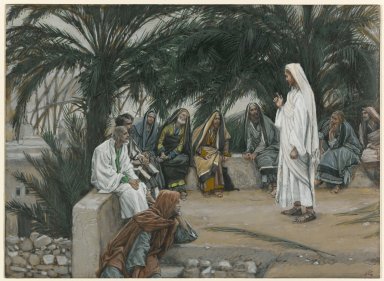[powerpress]

“Faith is the father of love, faith is the father of hope also, and its in faith, and faith alone, that we can plunge ourselves, like in a warm sea, to swim the strange currents that will come our way.”
On the beginning of unity “…you become a prayer…you contemplate God, because He always contemplates you…see how simple it is?”
To learn more about Catherine Doherty visit www.madonnahouse.org
Tags: alone, Catherine Doherty, faith, father, love
This entry was posted on Monday, December 22nd, 2014 at 8:42 pm
You can follow any responses to this entry through the RSS 2.0 feed.
From Anthony’s “Beginning to Pray” blog
Blessed Elisabeth of the Trinity helps us open our hearts to the coming of Christ. Â On the twelfth day of her Last Retreat, she offers a reflection on “the Word became flesh and dwelt among us.” Â Jesus has come to give us peace through opening up access to the Father’s house.
Whoever sees Christ sees the Father, and to see this love is to find that for which our hearts most long. Â This seeing, this contemplation, this knowledge is by faith. Â Here, faith is no mere assent to a body of information but a contemplative reality that seeks the saving truth and savors it. Â Faith is an encounter with the One whom the truths of our faith bear to us, and we believe what the Church proposes to us because we want to know Him. Â Whoever has surrendered his personal existence in response to the surpassing totality of love revealed by Christ crucified, this soul has gained access to the Father’s house, the freedom to go to our real spiritual home, the liberty that leads to our true peace.
Blessed Elisabeth sees the peace of Christ through the eyes of Saint Paul. Â Through the Blood of the Cross, the Lord leads all oppressive “Principalities and Powers” away “as captives, triumphing over them in Himself” (Col 2:15). Â Without the knowledge of Christ’s love, our dignity is vulnerable to all kinds of dehumanizing forces. Â But with the surpassing love we know in Christ Jesus, we are free from every form of irrational oppression — indeed, rather than rob of us dignity, the Lord permits all kinds of spiritual hardships only so that we might know the full extent of the greatness He calls us to and makes possible in our lives.
What the Apostle beheld in terms of oppressive cosmic forces, the Mystic of Dijon applies to our psychological powers.  Our interior battle with ambiguity and darkness in terms of our own patterns of thought and behavior is part of a cosmic struggle where evil powers attempt to overcome the light.  Just as Christ has taken diabolical powers captive, He also takes our psychological powers captive so that the ambiguity and confusion the emerges from them no longer robs us of our dignity as long as we persevere in believing in His love.  Her application  sees beyond the darkness of our interior frustrations to see the limitlessness of His mercy.
Beholding the unsurpassable love of the Lord, she understood how our limited powers of imagination, emotion, intuition, cognition and volition often hold us back. Â Without the Word of the Father, these powers subject us to a labyrinth of fears, anxieties, false judgments because they are subject, not to the truth, but to sin and disintegration. Â Left to their own, the powers of our soul frustrate that peace for which our hearts truly long.
Blessed Elisabeth also knew that Christ has the power to captivate, to hold even our own psychological powers captive. Â He does not lead our psychological powers by oppression and He is never violent. Â He attracts. Â He fascinates. Â He captivates – because in Him is the fullness of God, in Him all that is good, holy and true about humanity is revealed. Â His love is that beautiful and she knew this and longed for her friends to see it too. Â To see this love is to be freed from sin, to be raised up, to be capable of true praise.
Techniques and methods rooted primarily in our own powers lack the freedom to achieve moral rectitude and cannot access the peace of the Father’s house. Â Instead, Blessed Elisabeth invites us this Advent to allow our hearts to be drawn into a greater silence and solitude. Â The surpassing love of Christ is known in our weakness, poverty, and thirst. Â By humbling accepting this poverty of heart, the beatitude of His presence is ours.
Our faith truly accesses God. Â Instead of attempting spiritual feats of devotion, Blessed Elisabeth invites us to simply surrender to His presence breaking in all around us. Â To turn our thoughts to His great love is already to lift up our hearts. Â To waste time thinking on what He has done for us by humbly entering our human poverty, this is already to begin to taste eternity.
He is the light in the darkness and the darkness cannot overcome Him. Â So in the inconvenience and difficult of our poverty and lack of love, He remains, waiting for us so that we, each of us, is awaited by an uncommon love. Â She invites us to allow ourselves to be captivated: this Word, the Word made flesh, does not disdain humble humanity but cherishes his own birth in its frail freedom.
Tags: Anthony Lilles, faith, hearts, love
This entry was posted on Monday, December 22nd, 2014 at 8:28 pm
You can follow any responses to this entry through the RSS 2.0 feed.
Eighth Day – Jesus Made Himself the Bread of Life and the Hungry One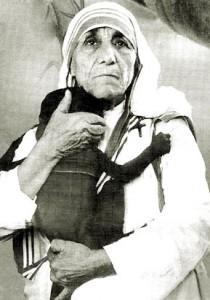
[powerpress]
Thought for the day: “Believe that He, Jesus, is in the appearance of Bread and that He, Jesus, is in the hungry, naked, sick, lonely, unloved, homeless, helpless and hopeless.â€
Ask for the grace of a deep faith to see Jesus in the Bread of Life and to serve Him in the distressing disguise of the poor.
Blessed Teresa of Calcutta, you allowed the thirsting love of Jesus on the Cross to become a living flame within you, and so became the light of His love to all.
Obtain from the Heart of Jesus (here make your request).
Teach me to allow Jesus to penetrate and possess my whole being so completely that my life, too, may radiate His light and love to others. Amen.
Immaculate Heart of Mary, Cause of Our Joy, pray for me. Blessed Teresa of Calcutta, pray for me.
text © Missionaries of Charity
Tags: blessed mother teresa of calcutta, catholic, catholic podcast, catholic prayer, cathollc spirituality, faith, Jesus, love
This entry was posted on Thursday, September 4th, 2014 at 12:43 am
You can follow any responses to this entry through the RSS 2.0 feed.
“Under the Mantle: Marian Thoughts from a 21st Century Priest” is fantastic!  Fr. Donald Calloway’s books just keep getting better and better.  In this work, he 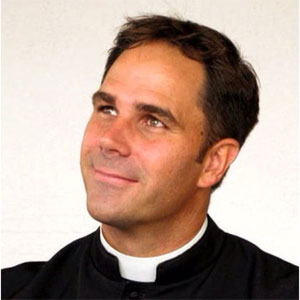 begins this journey with Our Lady, who then guides the reader through the rich treasures found in the Church established by her Son, Jesus Christ.  Through the Sacraments, to the depth of devotion found in our spiritual practices, and then with a  rich appreciation of what authentic manhood and femininity truly are,  Fr. Calloway explores the many facets of our faith.  This book is a book well suited for everyday mystagogia.  Without ever dumbing down the content, Fr. Calloway’s writing style is engaging and designed for “joe or josephine”  pew person.  This book is perfect for those who are in the RCIA, for folks who have completed a consecration preparation to Our Lady, or for anyone just looking for a more penetrating study of the faith.  You will not be disappointed!  And what a beautiful tribute to Our Blessed Mother!
begins this journey with Our Lady, who then guides the reader through the rich treasures found in the Church established by her Son, Jesus Christ.  Through the Sacraments, to the depth of devotion found in our spiritual practices, and then with a  rich appreciation of what authentic manhood and femininity truly are,  Fr. Calloway explores the many facets of our faith.  This book is a book well suited for everyday mystagogia.  Without ever dumbing down the content, Fr. Calloway’s writing style is engaging and designed for “joe or josephine”  pew person.  This book is perfect for those who are in the RCIA, for folks who have completed a consecration preparation to Our Lady, or for anyone just looking for a more penetrating study of the faith.  You will not be disappointed!  And what a beautiful tribute to Our Blessed Mother!
[powerpress]
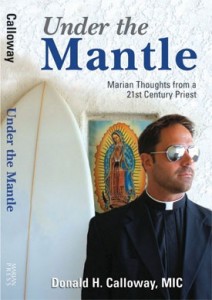 You can find the book here
You can find the book here
“We are living in an extraordinary time of grace and mercy. It is a time in which many people, through the intercession of the Blessed Virgin Mary, are experiencing a renewed appreciation for the sacred and unchanging truths of Catholicism. Though the vast majority of universities and colleges today indoctrinate their students into the dictatorship of moral relativism, the media puts forth an ideology of rampant secularism, and the political realm is filled with proponents of a culture of death, nevertheless, it is in these times that Jesus, through the Immaculata, is raising up a new generation of Catholics. In Under the Mantle: Marian Thoughts from a 21st Century Priest, Fr. Calloway masterfully blends together aspects of his own conversion story with profound theological insights into Catholicism, presenting everyone from “Joe six-pack in the pew” to a seminary rector with incredibly vivid and thought-provoking analogies into why it is so important for a Christian to live under the mantle of Mary. I very highly recommend that everyone read this book! ”
-Very Rev. Douglas Mosey, C.S.B., Ph.D. President-Rector
Holy Apostles College & Seminary. Cromwell, CT
Also check out: IP#16 Fr. Donald Calloway – No Turning Back on Inside the Pages
Tags: calloway, catholic, catholic podcast, catholic prayer, cathollc spirituality, Century Priest, faith, Mantle Marian Thoughts, marian helpers, marian press
This entry was posted on Saturday, June 28th, 2014 at 12:21 am
You can follow any responses to this entry through the RSS 2.0 feed.
“Do not return evil for evil”
[powerpress]
an excerpt from today’s reflection by Don Schwager:
What makes a disciple of Jesus Christ different from everyone else? What makes Christianity distinct from any other religion? It is grace – treating others, not as they deserve, but as God wishes them to be treated – with loving-kindness and mercy. Only the cross of Jesus Christ can free us from the tyranny of malice, hatred, revenge, and resentment and gives us the courage to return evil with good. Such love and grace has power to heal and to save from destruction. The Lord Jesus suffered insult, abuse, injustice, and death on a cross for our sake. Scripture tells us that the blood of Jesus Christ cleanses us from all sin and guilt (Matthew 26:28; Ephesians 1:7, I John 1:7, Revelation 1:5). Since God has been merciful towards us through the offering of his Son, Jesus Christ, we in turn are called to be merciful towards our neighbor, even those who cause us grief and harm. Do you know the power and freedom of Christ’s redeeming love and mercy?
“O merciful God, fill our hearts, we pray, with the graces of your Holy Spirit; with love, joy, peace, patience, gentleness, goodness, faithfulness, humility, and self-control. Teach us to love those who hate us; to pray for those who despitefully use us; that we may be the children of your love, our Father, who makes the sun to rise on the evil and the good, and sends rain on the just and on the unjust. In adversity grant us grace to be patient; in prosperity keep us humble; may we guard the door of our lips; may we lightly esteem the pleasures of this world, and thirst after heavenly things; through Jesus Christ our Lord. (Prayer of Anselm, 1033-1109)
for the full reflection visit : Daily Reading and Meditation
Tags: catholic, catholic podcast, catholic prayer, cathollc spirituality, children, daily reading, death, don schwager, evil, faith, father, freedom, graces, heaven, holy spirit, humility, injustice, Jesus, jesus christ, joy, Lord Jesus, love, meditation, mercy, prayer, reflection, religion, scripture
This entry was posted on Monday, June 16th, 2014 at 12:45 am
You can follow any responses to this entry through the RSS 2.0 feed.
[powerpress]Mike Aquilina offers the compelling story of the St. Perpetua and her great friend and sister in the faith, St. Felicity.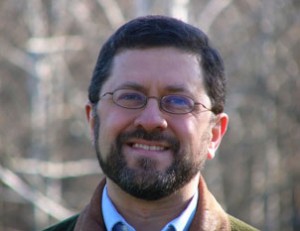
From CNA:
Saints Perpetua and Felicity were martyrs who died for the faith around the year 203.
St. Perpetua was a young, well-educated, noblewoman and mother living in the city of Carthage in North Africa. Her mother was a Christian and her father was a pagan. In terms of her faith, Perpetua followed the example of her mother. Despite the pleas of her father to deny her faith, Perpetua did the very opposite, and fearlessly proclaimed it. At the age of 22, she was imprisoned for her faith. While in prison she continued to care for her infant child and put up with the tortures designed to make her renounce her faith. Perpetua remained steadfast until the end. St. Perpetua was sacrificed at the games as a public spectacle for not renouncing her faith.
St. Felicity was a pregnant slave girl who was imprisoned with St. Perpetua. Little is known about the life of St. Felicity because, unlike Perpetua, she did not keep a diary of her life. After imprisonment and torture, Felicity was also condemned to die at the games. Only a few days before her execution, Felicity gave birth to a daughter who was secretly taken away to be cared for by some of the Faithful.
Tags: faith, mike aquilina, mother, perpetua
This entry was posted on Friday, March 7th, 2014 at 12:22 am
You can follow any responses to this entry through the RSS 2.0 feed.
[powerpress]
The Readings from the feast of St. John of the Cross:
FIRST READINGÂ Â Â Â Â Â Â Â Â Â 1 Corinthians 2:1-10a
When I came to you, brothers and sisters,
proclaiming the mystery of God,
I did not come with sublimity of words or of wisdom.
For I resolved to know nothing while I was with you
except Jesus Christ, and him crucified.
I came to you in weakness and fear and much trembling,
and my message and my proclamation
were not with persuasive words of wisdom,
but with a demonstration of spirit and power,
so that your faith might rest not on human wisdom
but on the power of God.
Yet we do speak a wisdom to those who are mature,
but not a wisdom of this age,
nor of the rulers of this age who are passing away.
Rather, we speak God’s wisdom, mysterious, hidden,
which God predetermined before the ages for our glory,
and which none of the rulers of this age knew
for, if they had known it,
they would not have crucified the Lord of glory.
But as it is written:
What eye has not seen, and ear has not heard,
and what has not entered the human heart,
what God has prepared for those who love him,
this God has revealed to us through the Spirit.
GOSPELÂ Â Â Â Â Â Â Â Â Â Luke 14:25-33
Great crowds were traveling with Jesus,
and he turned and addressed them,
“If anyone comes to me without hating his father and mother,
wife and children, brothers and sisters,
and even his own life,
he cannot be my disciple.
Whoever does not carry his own cross and come after me
cannot be my disciple.
Which of you wishing to construct a tower
does not first sit down and calculate the cost
to see if there is enough for its completion?
Otherwise, after laying the foundation
and finding himself unable to finish the work
the onlookers should laugh at him and say,
This one began to build but did not have the resources to finish.’
Or what king marching into battle would not first sit down
and decide whether with ten thousand troops
he can successfully oppose another king
advancing upon him with twenty thousand troops?
But if not, while he is still far away,
he will send a delegation to ask for peace terms.
In the same way,
every one of you who does not renounce all his possessions
cannot be my disciple.”
Tags: children, faith, GOSPEL, work
This entry was posted on Saturday, December 14th, 2013 at 1:54 pm
You can follow any responses to this entry through the RSS 2.0 feed.
USCCA4- Episode 4-Â Bring About the Obedience of Faith
[powerpress]
Archbishop Lucas offers insights on the US Catholic Catechism for Adults Chapter 4:
God makes himself known to us through Revelation in order both to give us something and to draw a response from us. Â Both this gift of God and our response to his Revelation are called faith. Â By faith, we are able to give our minds and hearts to God, to trust in his will, and to follow the direction he gives us.
The Most Reverend George J. Lucas leads the Archdiocese of Omaha.Â
For other episodes in the visit our Archbishop George Lucas page
This programs is based on:
More information can be found here.
We wish to thank the USCCB for the permissions granted for use of  relevant material used in this series.
Also we wish to thank Omar Gutierrez and Sr. Miriam Rita  for their vocal talents in this episode.
Tags: Archbishop George Lucas, Archbishop Lucas, faith, USCCB
This entry was posted on Wednesday, December 4th, 2013 at 1:44 pm
You can follow any responses to this entry through the RSS 2.0 feed.
[powerpress]
Reading 1 Â Â IS 4:2-6
The branch of the LORD will be luster and glory,
and the fruit of the earth will be honor and splendor
for the survivors of Israel.
He who remains in Zion
and he who is left in Jerusalem
Will be called holy:
every one marked down for life in Jerusalem.
When the LORD washes away
the filth of the daughters of Zion,
And purges Jerusalem’s blood from her midst
with a blast of searing judgment,
 Then will the LORD create,
Then will the LORD create,over the whole site of Mount Zion
and over her place of assembly,
A smoking cloud by day
and a light of flaming fire by night.
For over all, the LORD’s glory will be shelter and protection:
shade from the parching heat of day,
refuge and cover from storm and rain.
Gospel   MT 8:5-11
a centurion approached him and appealed to him, saying,
“Lord, my servant is lying at home paralyzed, suffering dreadfully.â€
He said to him, “I will come and cure him.â€
The centurion said in reply,
“Lord, I am not worthy to have you enter under my roof;
only say the word and my servant will be healed.
For I too am a man subject to authority,
with soldiers subject to me.
And I say to one, ‘Go,’ and he goes;
and to another, ‘Come here,’ and he comes;
and to my slave, ‘Do this,’ and he does it.â€
When Jesus heard this, he was amazed and said to those following him,
“Amen, I say to you, in no one in Israel have I found such faith.
I say to you, many will come from the east and the west,
and will recline with Abraham, Isaac, and Jacob
at the banquet in the Kingdom of heaven.â€
Lectionary for Mass for Use in the Dioceses of the United States, second typical edition, Copyright © 2001, 1998, 1997, 1986, 1970 Confraternity of Christian Doctrine
Tags: faith, Israel, Jesus, LORD
This entry was posted on Monday, December 2nd, 2013 at 2:21 pm
You can follow any responses to this entry through the RSS 2.0 feed.
Born Again in Baptism
[powerpress]
Are you born again? It’s a question that Catholics aren’t quite sure how to respond to, but those who are living out their faith should answer with a whole-hearted Yes.
The term “born again†comes from John 3 when our Lord tells Nicodemus, “Amen, Amen, I say to you, no one can see the kingdom of God without being born from above,â€1 or “born again,†as some translations put it. Nicodemus is confused, thinking that Jesus is referring to a 2nd physical birth, so Jesus clarifies that “no one can enter the kingdom of God without being born of water and Spirit.â€2 The early Church unanimously interpreted this as a reference to the sacrament of baptism, 3 which is no mere symbolic ritual, but the normative instrument that Christ instituted for our spiritual rebirth.
Romans 6 says that in baptism our old natures are buried and we are raised to new life in Christ. 4 And 1 Peter 3:21 puts it plainly, “baptism now saves you.â€
Salvation is a lifelong process, a race to the finish line. But baptism is where it all begins, where we are born again, if you will.
1 – Jn. 3:3
2 – Jn. 3:5
3 – See Catholic Answers website on subject: http://www.catholic.com/library/Born_Again_in_Baptism.asp
4 – Rom. 6:3-4
Tags: baptism, born again, catholic apologetics, faith, Faith Check
This entry was posted on Sunday, December 1st, 2013 at 7:26 am
You can follow any responses to this entry through the RSS 2.0 feed.
What a joy to talk about the saints with Paul Thigpen. and discuss this INCREDIBLE book! Not just an ascetically gorgeous work, worthy of the 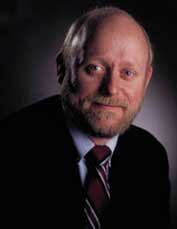 mystery it contains, but “A Year With the Saints: Daily Meditations with the Holy Ones of God” is filled with guided meditations, teachings, and prayers with the “Great Cloud of Witnesses”. Dr. Thigpen, who earned his PhD in Church History, also guides through a wonderful catechesis of the faith through these “love letters” from history.  The perfect gift…period.
mystery it contains, but “A Year With the Saints: Daily Meditations with the Holy Ones of God” is filled with guided meditations, teachings, and prayers with the “Great Cloud of Witnesses”. Dr. Thigpen, who earned his PhD in Church History, also guides through a wonderful catechesis of the faith through these “love letters” from history.  The perfect gift…period.
In this conversation, we discuss many topics, including:
Why the saints? Do we need them? How can they help us grow in faith?
[powerpress]
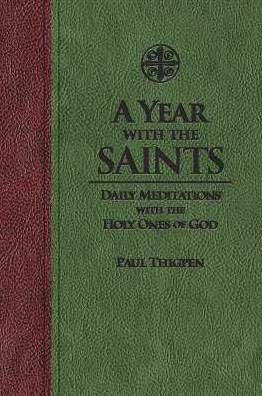 You can find the book here
You can find the book here
“Those who follow the saints”, said Pope Clement I, “will themselves become saints”. Their words and deeds provide a treasury of time-tested wisdom, encouragement, and inspiration for the pursuit of holiness.
Best-selling Catholic author Paul Thigpen opens up that treasury in A Year With the Saints: Daily Meditations With the Holy Ones of God. These 365 reflections draw from the writings and lives of holy men and women across two thousand years. Their spiritual and practical insights for Christian living are as fresh and relevant today as they were when they were first written.
Tags: faith, paul thigpen, saints, work
This entry was posted on Wednesday, November 27th, 2013 at 8:06 am
You can follow any responses to this entry through the RSS 2.0 feed.
Works of the Law
[powerpress]
In Romans and Galatians, St. Paul warns about those trying to justify themselves before God by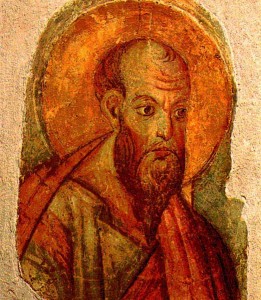 following the works of the Law.Â
following the works of the Law.Â
To properly understand this, we must look at the historical context. As we read in the Acts, there was a group in the early Church called the “Judaizers,â€1 which taught that Gentile converts to Christianity must be circumcised and follow the kosher laws.
Paul says in no uncertain terms that those trying to be saved through these Old Testament works of the Law have rejected Christ and lost their salvation.
The attitude of the Judaizers is contrasted with the faith of Abraham,2 who trusted and obeyed God even to the point of offering his own son, Isaac. Paul’s point is not that our works have no bearing on our salvation, but rather that these particular Jewish rituals were not necessary for eternal life.
For the same Romans that teaches “a man is justified by faith apart from works of the law,â€3 also says that God “shows no partiality … [for] he will render to everyone according to his works..†4
There is no contradiction, as long as we correctly understand what Paul meant by the works of the law.
1 -Â cf. Acts 15:1-6, etc.
2 -Â Rom. 4:1ff
3 -Â 3:28
4 -Â 2:6-10
Tags: catholic apologetics, eternal life, faith, Faith Check, law, st. paul, works
This entry was posted on Monday, November 25th, 2013 at 7:06 am
You can follow any responses to this entry through the RSS 2.0 feed.
As if Already in Eternity: The Wisdom of Blessed Elisabeth of the Trinity (as found on Anthony’s “Beginning to Pray” blog site)
Blessed Elisabeth of the Trinity is a witness to the primacy of contemplation in the life of the Church and the mystical wisdom contemplation releases into human history. Â This is the wisdom that understands how God is present in both the public square as well as in the intimacy of our hearts. Â Today, when the whole world needs this wisdom renewed, the Church celebrates her feast day and invites us to consider her powerful spiritual doctrine.
She wrote a famous prayer to the Holy Trinity that has helped many contemplatives recover devotion to the Divine Persons in their life of prayer.  This work is cited to support the  Catechism of the Catholic Church’s teaching on the Divine Works and the Trinitarian Missions.  The teaching itself is that God calls every individual to a great and beautiful purpose, to become a dwelling place for His presence in the world:
The ultimate end of the divine economy is the entry of God’s creatures into the perfect unity of the Blessed Trinity. Â But even now we are called to be a dwelling for the Most Holy Trinity, ‘If a man loves me,’ says the Lord, ‘he will keep my word, and my Father will love him, and we will come to him, and make our home with him’ (CCC 260).
This is a rich teaching because it says that our ultimate fulfillment is not simply something waiting for us in a remote future, in a distant afterlife. Â Instead, the Catechism proposes that heaven can begin now in faith. Â This means that our faith offers us a fullness of life. Â We do not have to be content with managing through life’s ambiguities and uncertainties with the hope that someday it might get better. Â Instead, our faith gives us a real foretaste of the fullness that awaits us — so that the excessiveness of God’s love can pour into our lives here and now, if we will believe in Him.
To encourage this decision to believe in the love that God has for us in the here and now of our lives, the Catechism cites the beginning of Blessed Elisabeth’s prayer to the Trinity, “O my God, Trinity whom I adore, help me to forget myself entirely so to establish myself in you, unmovable and peaceful as if my soul were already in eternity.”
Blessed Elisabeth’s prayer helps us consider what it means to have faith, to believe in God and what He calls us to become. Â This kind of faith is a matter of a love that takes us out of ourselves. It is, in this sense, an ecstatic movement of heart, a decision to lay aside everything so that there is space for God to dwell in us. Â Faith helps us see that our own bloated egos need to make way for God. Â To love Christ to the point of welcoming His word in our hearts means He can begin to help us forget our very self. Â He is the One who frees us so that the fullness of life that awaits us in heaven begins here on earth.
Her words suggest that the biggest obstacle to prayer is not anything outside ourselves, but proclivities within. Â The ego has its own specific gravity. Â Its force, if left unchecked, its deadly. Â Anxieties over our own plans and for security, our lust for control and to put others in their place, our need to be right and esteemed, our obsession with being liked or affirmed, our gluttony for comfort and entertainment; all of this fails to provide any firm ground for rectifying our existence. Â Unchecked, these tendencies suffocate the heart, and as long as one’s heart is pulled by these forces, it can find no peace.
Only when we can get out of ourselves are we able to breath the fresh air of friendship with God and true solidarity with one
another. Â At the same time, even after we see how imprisoned we are, left to our own resources, we cannot entirely free ourselves. Â The answer is not to be found in our own cleverness or in some Titanic effort to surmount oneself through techniques. Â Only Christ can help us leave our old way of life behind. Â This is why Blessed Elisabeth’s prayer begins with a cry for help.
Clinging to what Christ has revealed about the Father and about humanity, this is the essential movement of faith. Â This is His word to us – for He is the saving Word that reveals this inexhaustible mystery. Â Those whose hearts are vulnerable to this radiant beauty find true inner freedom.
Souls whom Christ helps to be free of themselves stand firm in love even as everything in life falls apart around them. Â This is only because through Christ they have found the ground of their very being in the excessive love flowing from the Holy Trinity into their nights, their voids, their inadequacies and even their failures. Â In short, come what come may they know they are loved and that love awaits them.
It by standing on this ground that a soul opens itself to God’s presence in ever new and surprising ways. Â On this ground, He dwells in them. Â With the inflow of His truth and love, it is easy to let go and to trust, and anyone who has discovered this freedom wants to be established there in an unmovable way.
Today is the feast of Blessed Elisabeth of the Trinity. Â She lived out this truth to her last anguished heartbeat, bedridden with an incurable disease even as the political powers of her day threatened those she loved the most and the Church was rocked by all kinds of scandal. Â This Carmelite Mystic, the Mystic of Dijon, believed her mission was to help souls enter to a transforming encounter with Christ, one that requires a journey out of ourselves where we are vulnerable enough to be touched by Him. Her words encourage us to call out to the Word, and to let His great Canticle of love resound in our hearts with all its fulness — for to know this saving truth is to live as if already in eternity.
Tags: Anthony Lilles, Blessed Elisabeth, faith, love
This entry was posted on Monday, November 11th, 2013 at 12:13 am
You can follow any responses to this entry through the RSS 2.0 feed.
Reliability of Oral Tradition
[powerpress]
In the modern world, oral means of communication are deemed inherently unreliable as we’ve all heard of the game of telephone where a phrase is whispered around a circle and it comes out nothing like the original.
But scholars have shown that in the ancient world, and to this day in some places, oral traditions were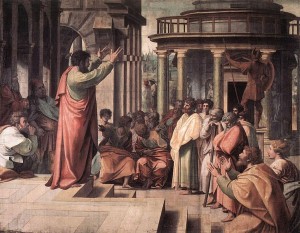 memorized and passed down to multiple generations without alteration.1
memorized and passed down to multiple generations without alteration.1
When the apostles went out to teach the Faith, they did not whisper it in secret, but proclaimed it publicly to the multitudes. Oral tradition was the normative means of passing on the faith, as St. Paul’s says in 2 Timothy 2:2, “what you have heard from me before many witnesses entrust to faithful men who will be able to teach others also.â€
There is no evidence that a widespread change in belief took place among the early Christians. Quite the opposite, at the end of the second century St. Irenaeus wrote that while the Church had spread over the entire known world, the Faith had been maintained in tact everywhere,2 something only attributable to the Holy Spirit.
1 -Â e.g., . Kenneth Bailey, “Informal, Controlled, Oral Tradition and the Synoptic Gospels” Asia Journal of Theology, 5.1
(1991)
2 -Â Against Heresies 1:10:2 [ca. A.D. 180]
Tags: Against Heresies, apostles, catholic apologetics, faith, Faith Check, oral tradition
This entry was posted on Tuesday, October 22nd, 2013 at 4:23 pm
You can follow any responses to this entry through the RSS 2.0 feed.
CW2 – Praying with the Angels  – The Great Cloud of Witnesses: Guides 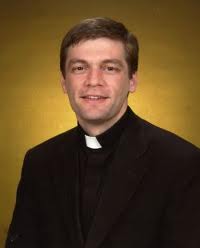 for Prayer with Fr. Mark Cyza
for Prayer with Fr. Mark Cyza
[powerpress]
Fr. Mark Cyza discusses the Angels. Â Guardian Angels and their purpose, as well as, how to pray with our Guardian Angel is part of the teaching he touches upon. Â He also touches upon the difference between the Holy Angels and the Fallen Angels, what is the proper understanding we should have concerning them.
 From the Catechism of the Catholic Church
The existence of angels – a truth of faith
328Â The existence of the spiritual, non-corporeal beings that Sacred Scripture usually calls “angels” is a truth of faith. The witness of Scripture is as clear as the unanimity of Tradition.
329 St. Augustine says: “‘Angel’ is the name of their office, not of their nature. If you seek the name of their nature, it is ‘spirit’; if you seek the name of their office, it is ‘angel’: from what they are, ‘spirit’, from what they do, ‘angel.'”188 With their whole beings the angels are servants and messengers of God. Because they “always behold the face of my Father who is in heaven” they are the “mighty ones who do his word, hearkening to the voice of his word”.189
330 As purely spiritual creatures angels have intelligence and will: they are personal and immortal creatures, surpassing in perfection all visible creatures, as the splendor of their glory bears witness.190
331 Christ is the center of the angelic world. They are his angels: “When the Son of man comes in his glory, and all the angels with him. . “191 They belong to him because they were created through and for him: “for in him all things were created in heaven and on earth, visible and invisible, whether thrones or dominions or principalities or authorities – all things were created through him and for him.”192 They belong to him still more because he has made them messengers of his saving plan: “Are they not all ministering spirits sent forth to serve, for the sake of those who are to obtain salvation?”193
332Â Angels have been present since creation and throughout the history of salvation, announcing this salvation from afar or near and serving the accomplishment of the divine plan: they closed the earthly paradise; protected Lot; saved Hagar and her child; stayed Abraham’s hand; communicated the law by their ministry; led the People of God; announced births and callings; and assisted the prophets, just to cite a few examples.194Â Finally, the angel Gabriel announced the birth of the Precursor and that of Jesus himself.195 (more…)
Tags: Church, faith, Mark Cyza, truth
This entry was posted on Wednesday, October 2nd, 2013 at 1:58 am
You can follow any responses to this entry through the RSS 2.0 feed.



